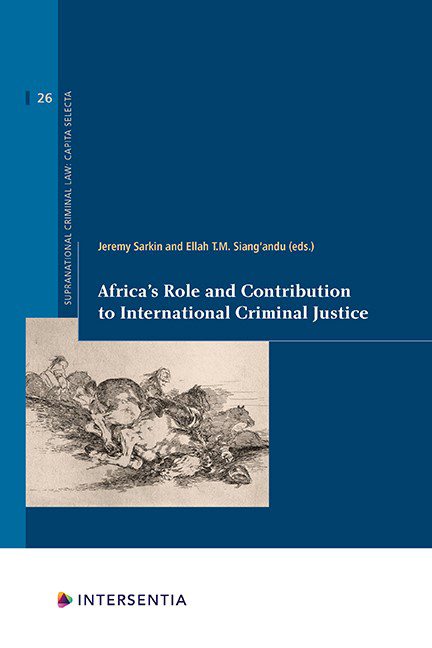Book contents
- Frontmatter
- Acknowledgements
- Contents
- List of Contributors
- Introduction: Understanding the Meaning, Context, Role and Importance of African Criminal Justice on the Continent and Beyond
- Types of International Criminal Courts in Africa
- The Extraordinary African Chambers in the Senegalese Courts and the Development of International Criminal Law in Africa
- The Use of International Criminal Law in African Countries
- The Nuremberg Principles in the Context of Africa: The Theory and Practice of Individual and Corporate Criminal Responsibility
- The Application of Universal Jurisdiction in Africa
- African Victims of Mass Atrocities Before Domestic Jurisdictions and the International Criminal Court: Bargaining for Justice
- The Role of the International Criminal Court in Africa: The Epic Fails?
- Is the African Court on Human and Peoples’ Rights with Criminal Jurisdiction an African Solution to an African Problem?
- Head of State Immunity in the African Context
- Index
Types of International Criminal Courts in Africa
Published online by Cambridge University Press: 11 February 2021
- Frontmatter
- Acknowledgements
- Contents
- List of Contributors
- Introduction: Understanding the Meaning, Context, Role and Importance of African Criminal Justice on the Continent and Beyond
- Types of International Criminal Courts in Africa
- The Extraordinary African Chambers in the Senegalese Courts and the Development of International Criminal Law in Africa
- The Use of International Criminal Law in African Countries
- The Nuremberg Principles in the Context of Africa: The Theory and Practice of Individual and Corporate Criminal Responsibility
- The Application of Universal Jurisdiction in Africa
- African Victims of Mass Atrocities Before Domestic Jurisdictions and the International Criminal Court: Bargaining for Justice
- The Role of the International Criminal Court in Africa: The Epic Fails?
- Is the African Court on Human and Peoples’ Rights with Criminal Jurisdiction an African Solution to an African Problem?
- Head of State Immunity in the African Context
- Index
Summary
INTRODUCTION
The establishment of the Nuremberg and the Tokyo tribunals in 1945 by the Allied Forces to prosecute German and Japanese war criminals for abuses carried out during the Second World War marked the beginning of formalised international criminal justice at the global level. Until then, breaches of international criminal law, whether treaty-based or custom-based, had been prosecuted by states through national courts to the extent that such breaches were incorporated into national laws (Damrosch et al. 2001). Subsequent efforts by the United Nations (UN) to establish an international criminal tribunal after Nuremberg and Tokyo to prosecute genocide and other war crimes proved futile due to the Cold War (Hobbs 2016: 500; Roht-Arriaza 1999: 477). Thus, after the Nuremberg and Tokyo tribunals, there were no such trials until 1992, when the UN Security Council established the International Criminal Tribunal for the former Yugoslavia (ICTY) in response to the genocide that took place in that country from the beginning of 1991. Shortly afterwards, a civil war broke out between the Hutus and the Tutsis of Rwanda, which led to the establishment of the International Criminal Tribunal for Rwanda (ICTR) by the Security Council in 1994. In the same year, 1994, the UN revived its earlier initiatives towards a permanent mechanism for the prosecution of war crimes, culminating in the establishment of the International Criminal Court (ICC) (Damrosch et al. 2001). Following the creation of the ICTY, the ICTR and the ICC, the international community sought to establish domesticated international courts – international criminal mechanisms with national components.
Various forms of international criminal courts have been established in Africa since the 1990s to prosecute breaches of international humanitarian law and human rights in certain conflict situations. The international criminal courts in Africa can be grouped into three categories. The first is a purely international court established and administered as an organ of the UN, i.e. the ICTR. The second category is an independent hybrid international court not anchored in the UN or the national judicial system, i.e. the Special Court for Sierra Leone (SCSL). The third category consists of courts that are divisions of existing national judicial systems.
- Type
- Chapter
- Information
- Publisher: IntersentiaPrint publication year: 2020
- 1
- Cited by



